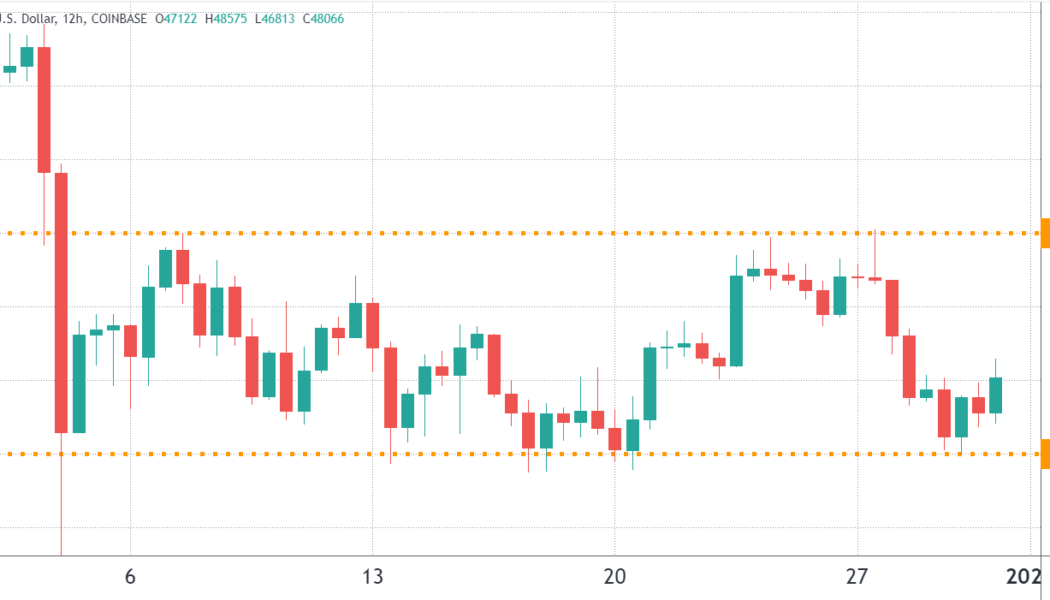Bitcoin’s (BTC) price has been ranging between $46,000 and $52,000 for 26 days. Despite the large nominal $6.1 billion year-end options expiry, the bullish and bearish instruments were evenly balanced between $44,000 and $49,000.
Therefore, it was no surprise that the $47,175 price at 8:00 am UTC on Dec. 31 brought little change to the price structure. Even the 3% rally to $48,500 following the event failed to sustain itself, signaling that bears are unwilling to cede their upper hand.

Bulls might have interpreted the 9,925 BTC leaving Coinbase in 24 hours as a positive trigger, considering fewer coins are available on exchanges for newcomers. Besides, the first week of the year has been positive for the past four years, averaging 18.5% gains for Bitcoin holders.
To further support bulls’ thesis, the United States listed tech company MicroStrategy added another 1,914 BTC to their balance sheet on Dec. 30. On the negative side, regulation continues to pressure the markets as South Korean exchanges require users to verify their third-party wallet addresses to comply with the Financial Action Task Force (FATF) travel rule guidelines.
Bitcoin had a stellar 2021 anyway
Regardless of the short-term bearishness behind December’s 16% price drop, Bitcoin continues to vastly outperform both U.S. stocks and gold for the third year in a row. Yet, that performance was not enough to avoid every $48,000 and higher call (buy) option instrument becoming worthless as the Dec. 31 expiry price came in lower.

At first sight, the $4.0 billion call (buy) options vastly outperformed the $2.1 billion put (sell) instruments, but the 1.9 call-to-put ratio is deceptive because the 16% price drop from Nov.’s $57,000 close wiped out most of the bullish bets. Therefore, there is no value in the right to buy Bitcoin (call option) at $50,000 if it is trading below that price.
Bulls and bears instruments were evenly marched for the Dec. 31 Bitcoin options expiry, which came in much smaller than expected at $660 million. Yet, bears were unable to take control as 85% of their bets have been placed at $47,000 or below. Such data partially explains why the Dec. 31 expiry was followed by an attempt from bulls to regain momentum.
Will the first week of 2022 finally be able to revert the slightly negative sentiment that has prevailed since the Dec. 3 crash? Unfortunately, according to Bitcoin options markets, there is no indication that the tide has changed.
The views and opinions expressed here are solely those of the author and do not necessarily reflect the views of Cointelegraph. Every investment and trading move involves risk. You should conduct your own research when making a decision.
 [flexi-common-toolbar] [flexi-form class=”flexi_form_style” title=”Submit to Flexi” name=”my_form” ajax=”true”][flexi-form-tag type=”post_title” class=”fl-input” title=”Title” value=”” required=”true”][flexi-form-tag type=”category” title=”Select category”][flexi-form-tag type=”tag” title=”Insert tag”][flexi-form-tag type=”article” class=”fl-textarea” title=”Description” ][flexi-form-tag type=”file” title=”Select file” required=”true”][flexi-form-tag type=”submit” name=”submit” value=”Submit Now”] [/flexi-form]
[flexi-common-toolbar] [flexi-form class=”flexi_form_style” title=”Submit to Flexi” name=”my_form” ajax=”true”][flexi-form-tag type=”post_title” class=”fl-input” title=”Title” value=”” required=”true”][flexi-form-tag type=”category” title=”Select category”][flexi-form-tag type=”tag” title=”Insert tag”][flexi-form-tag type=”article” class=”fl-textarea” title=”Description” ][flexi-form-tag type=”file” title=”Select file” required=”true”][flexi-form-tag type=”submit” name=”submit” value=”Submit Now”] [/flexi-form]










Tagged: BTC derivatives, Coinbase, crypto blog, Crypto news, deribit, Expiry, Markets, MicroStrategy, Options